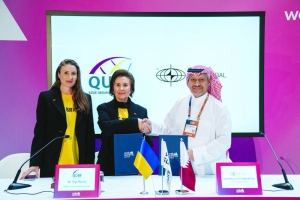Qatar Advances Digital Inclusion For All Residents

Qatar is making significant strides toward enhancing its digital infrastructure and services, aiming to achieve inclusivity by 2030. A recent event, which was warmly received by the public, marked the launch of the 2024 Digital Inclusion Index (DII) by the Ministry of Communications and Information Technology (MCIT). The index serves as both a metric and promotion platform to advocate for equal digital access for all residents.
Reem Al Mansoori, the Assistant Undersecretary for Digital Industry Affairs at MCIT, emphasized, “Our goal is clear: to establish a foundational standard for full inclusivity.” This digital inclusion initiative is woven closely with Qatar’s vision of becoming one of the leading nations globally by ensuring no resident is left behind as digital services become more intrinsic to daily life.
The DII focuses on several key areas to measure progress—digital access, affordability, competency, content availability, and more—ensuring interventions can be targeted effectively. This framework is particularly aligned with the United Nations’ Sustainable Development Goals (SDGs), which underline the importance of providing resources to enable digital engagement for everyone. Al Mansoori elaborated, “Qatar’s focus on digital inclusion aligns closely with objectives set out by the UN Sustainable Development Goals.”
Remarkably, Qatar currently ranks first globally when it employs standards of digital accessibility rights. The index revealed impressive statistics; 93% of the population has access to the internet, placing Qatar as the ninth-best nation globally for internet accessibility. Further, approximately 85% of the population possesses adequate digital skills, demonstrating the country’s ability to prepare its residents for future technological landscapes.
Through the DII report, it is clear Qatar is not resting on its achievements. The government has set ambitious targets for the next five years: increasing digital access by 10%, improving digital competencies for citizens by 30%, enhancing digital skills by 15%, and boosting digital trust by 20%. Ensuring all residents can partake equally will not only promote societal welfare but also spur economic growth and educational opportunities.
The DII also serves as a detailed guide for identifying areas needing improvement, providing continuous feedback for policymakers and stakeholders. “The DII is intended as a strategic tool for measuring progress and recognition,” Al Mansoori asserted, highlighting its importance as both a metric and motivator. This is due to the recognition it provides, not only locally but internationally.
An expansive educational framework accompanies these initiatives, focusing on technology training to bolster residents’ digital competencies, making them integral players within the digital economy. These educational efforts are fundamental as digital literacy emerges as the new literacy, empowering residents to navigate the increasingly interconnected world.
Qatar’s strategic plans place intelligence-driven infrastructure at the forefront, with initiatives aimed at enhancing digital trust among the population. By fortifying regulatory frameworks, particularly around technologies like artificial intelligence (AI) and the Internet of Things (IoT), officials foresee progress toward fostering security and confidence. The high reliance—83%—Qataris place on basic digital activities such as e-commerce and e-government showcases the nation’s success in creating trust within its digital ecosystem.
Officials view this infusion of advanced technology and inclusivity as integral to achieving the objectives outlined within the Qatar National Vision 2030. Alongside articulation for enhancing digital competencies, the strategic roadmap interlaces social good, economic prosperity, and e-governance improvements. Given these trajectories, Qatar appears steadfast on its path toward realizing its ambitious vision.
Community engagement plays a hallmark role, which was evident during the recent Downtown Tech exhibition advancements. Such events underline the commitment Qatar maintains to making technology accessible and engaging. With over 130,000 attendees experiencing direct interactions with innovations ranging from artificial intelligence to robots, the desire for engaging technology is palpable.
Looking forward, Qatar is poised to significantly advance its digital reach, relying on its existing frameworks and enthusiastic participation. Al Mansoori concluded her statements on optimism: “To succeed, we need to embed inclusivity at every level of our strategy. There’s wind behind our sails as we reimagine the vast potentials available to us through technology.”
Related
QUBF launches ‘Qatar-Ukraine Tech and Innovation Committee’
Dr Olga Revina, chairperson of QUBF, and Sheikh Mansoor bin Khalifa al-Thani, fou
Initiative to support digital innovation in Qatar launched
Assistant Undersecretary for Digital Industry Affairs at MCIT Reem Al Mansoori, and General Manager of Microsoft Qatar Lana Khalaf exchanging documents after s
MCIT, Microsoft Sign Partnership Initiative to Support Digital Innovation and…
As part of its efforts to enhance digital innovation and support the growth of startups in the country, the Ministry of Communications and Information Technolog
IIA Qatar hosts session on tech-driven transformation in internal audit
Officials pose during the seminar hosted by Institute of Internal Auditor Qatar Chapter. Doha, Qatar: The Institute of Internal Auditor Qatar Chapter r












